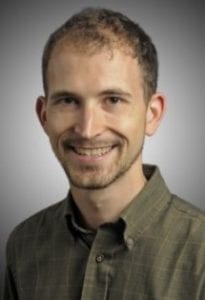Finalist for American Physical Society Award
Dr. Michael Chini, a recent graduate from UCF’s Department of Physics (PhD, 2012) and currentResearch Scientist in the Townes Laser Institute of UCF’s College of Optics and Photonics (CREOL), is a finalist for the American Physical Society‘s Outstanding Doctoral Dissertation in Laser Science Award for his dissertation, entitled “Characterization and Application of Isolated Attosecond Pulses”.
He will present his dissertation in a 30 minute special session at the Frontiers in Optics/Laser Science Conference in Tucson, Arizona in October. Should he win, Dr. Chini will be presented with $1,000 and a certificate documenting his contribution.
His research focuses on attosecond science, the basic idea of which is to study the motion of electrons on their natural time scale – which is attoseconds (1 attosecond = 10^-18 seconds). This is about a billion times faster than any detectors or cameras which are available, so we instead have to use extremely short attosecond laser pulses to observe this motion.
Attosecond electron dynamics may play a major role in the development of new technologies, particularly for solar energy harvesting and petahertz-scale electronics.
Recently, we were able to interview Dr. Chini on his accomplishment and advice for colleagues and students.
Describe what you thought when you received the email stating you were a finalist.
I was proud to learn that I had been selected as a finalist. As a graduate student, you spend many long hours in the lab doing research with the goal of making an impact on the scientific community. Being recognized for my dissertation research is really an honor, as it shows that other laser scientists view my work as an important contribution to the field.
How long did it take to research and write your dissertation?
I began my research in 2007 at Kansas State University. In 2010, I moved from Kansas State to UCF with my advisor, Professor Zenghu Chang, to build a new laboratory for attosecond science, and defended my dissertation and graduated with my PhD in 2012. In all, my research took more than 5 years, and I took about 3 months to write the dissertation.
How do you feel about going to present your dissertation at the Laser Science Conference in Arizona?
I am excited to present my dissertation work at the Laser Science Conference, since many of the world’s laser experts will attend the conference. I have presented at this conference in previous years, but it is an extra honor to be selected to present in the special session for the award finalists.
Do you feel winning the award would impact your research or career?
Winning the award would definitely have an impact on my future career, as it would expose a wider audience to my research. The added “name recognition” will also help me to compete for faculty positions and for funding opportunities in the future.
Do you have any advice for students or colleagues struggling with or thinking of writing a dissertation?
Many students see the dissertation as just an obstacle to cross before graduation. However, it also closes an important chapter of a person’s life. I would encourage students to take writing the dissertation as an opportunity to reflect on and record the successes of their graduate careers, and to be thankful to the people who helped them get to that point.
The College of Sciences is proud of Dr. Chini’s success and commitment to UCF. We wish him the best of luck on his presentation and in the final stages of the award selection.

